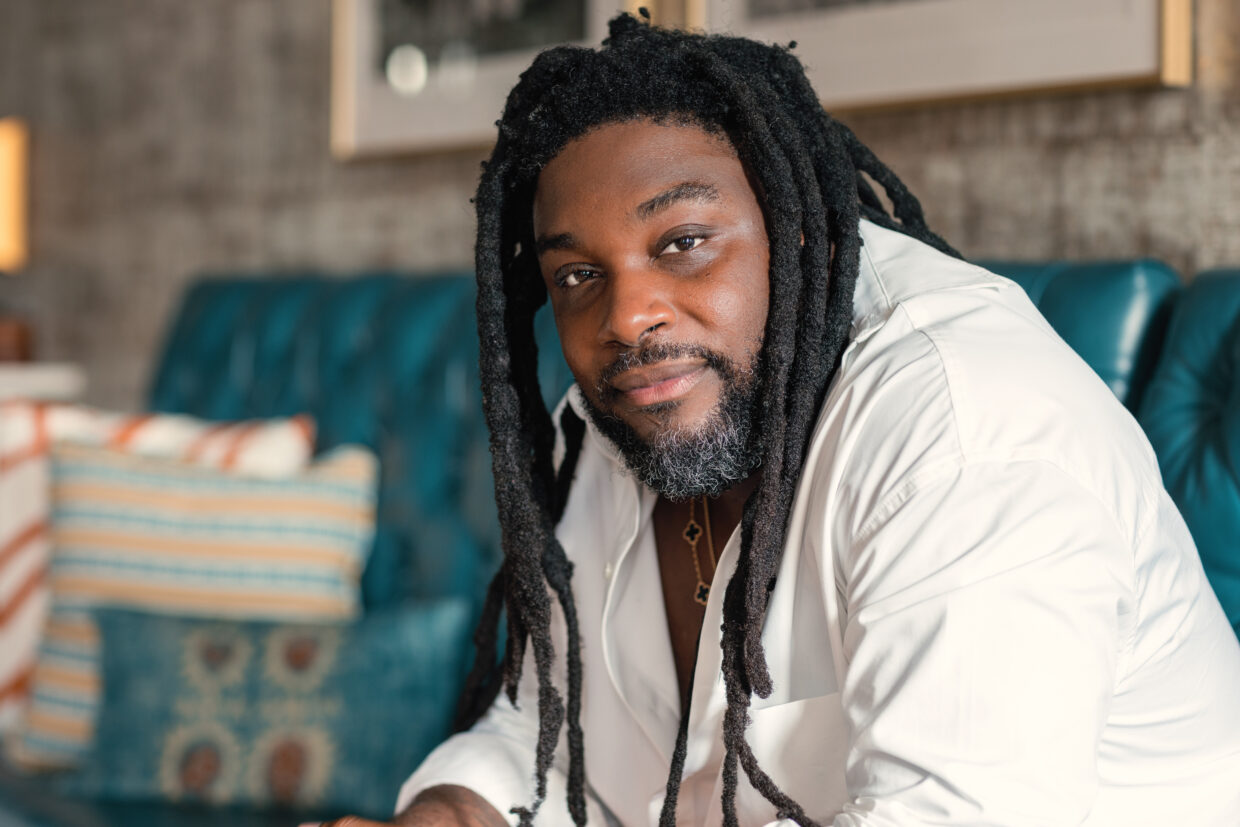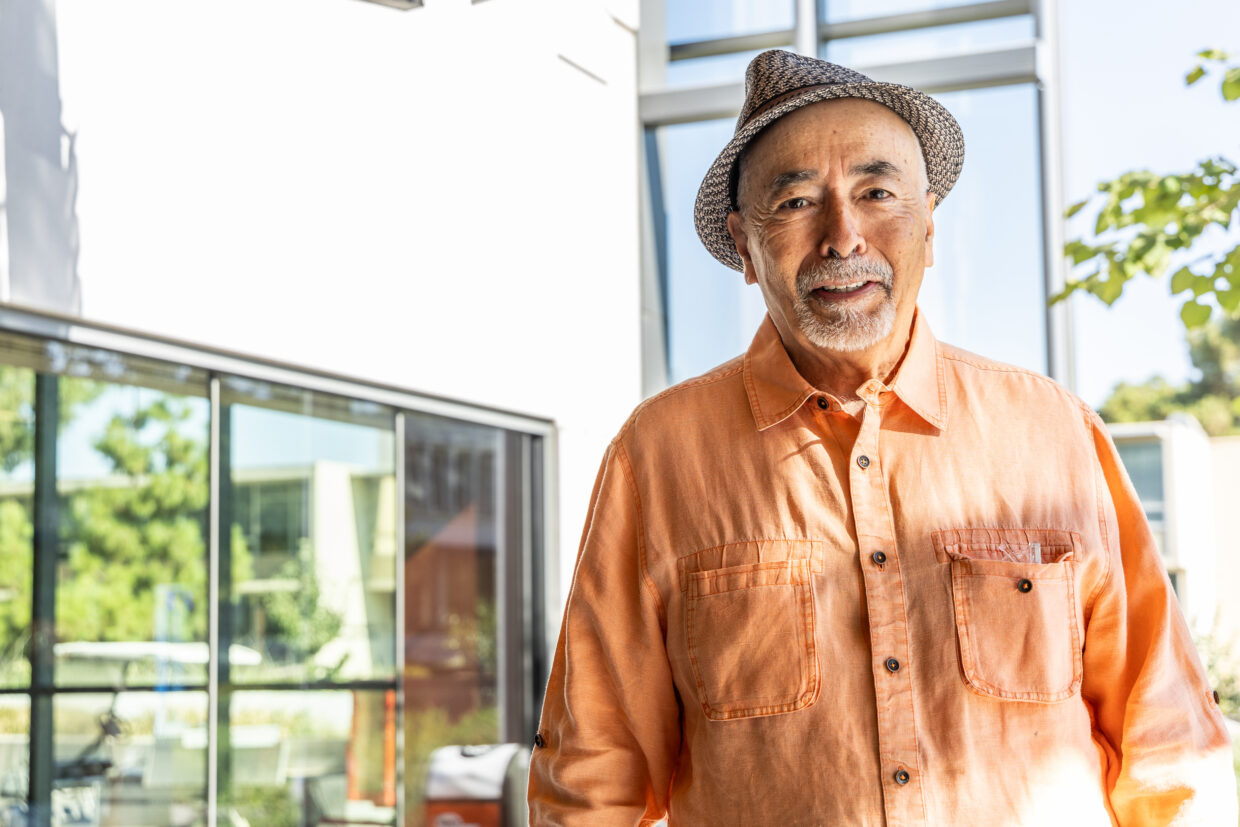Last month, the MacArthur Foundation announced its latest fellowship class—unofficially known as the “Genius Grant,” the MacArthur Fellowship awards $800,000 “to extraordinarily talented and creative individuals as an investment in their potential.”
Article continues after advertisement
Literary Hub caught up with four of the 2024 winners—Jericho Brown, Ling Ma, Jason Reynolds, and Juan Felipe Herrera—to ask about their cultural touchstones, their literary educations, and the best (and worst) writing advice they’ve ever received.
Here’s what they told us:

Jericho Brown
What’s the best or worst writing advice you’ve ever received?
The best writing advice I ever got comes by way of example. I noticed that the writers I admire most spent their time reading and writing, that reading the work that inspires them and committing to time set aside for creation is a part of their lives as much as eating dinner or walking the dog.
The worst advice I ever got still comes to me in the form of accusatory questions about when my next book is going to appear. My job is well-wrought writing. My job is not the production of a book every so many years. There is this sense that we should be in a rush, but for what? For whom?
Who is the person, or what is the place or practice that had the most significant impact on your writing education?
I fully committed myself to writing because of pre-Katrina New Orleans. I graduated from Dillard University where Louisiana State Poet Laureate Mona Lisa Saloy had been my teacher and where 1998 American Book Award winner Brenda Marie Osbey had also matriculated. Osbey was giving readings at Dillard and throughout New Orleans when I began my education there.
When I graduated, Toi Derricotte, Gloria Wade Gayles, Yona Harvey, Terrance Hayes, and Major Jackson all happened to move to the city at the same time. Their presence shifted the environment and put me in direct contact with Black writers who were always willing to talk about literature. I also joined the NOMMO Literary Society led by Kalamu ya Salaam where I met some really amazing writers who were always honest with me about my work, including my friend Cassandra Lane.
All of the confluence of influence led to me taking poetry workshops with John Gery and Kay Murphy at the University of New Orleans where I would eventually earn my MFA. No other city at any other time could have offered me that.
Yes, I could have been surrounded by great writers in…I don’t know…New York City or somewhere. But that environment wouldn’t have made those writers feel they should make themselves available to me. New Orleans enhances people’s propensity for kindness.
Which non-literary piece of culture—film, tv show, painting, song—could you not imagine your life without?
I saw Stevie Wonder perform again recently, and I realized that my love for his work has a great deal to do with how it gave me options for feeling and being I may not have otherwise recognized were available to me.
The music and lyrics of his songs have a lot to do with how I think of myself as an artistic descendant and as a part of the various communities that nurture me and as a lifelong applicant to becoming an ancestor. I wouldn’t be as good at making love if I had never heard a Stevie Wonder song. I wouldn’t imagine as much of a mandate for formal inventiveness if I never heard a Stevie Wonder song. I think they helped me understand how to be more comfortable with my own rage and the fact that it’s often a perfectly understandable response.
Which book do you recommend most?
I think it’s a good idea to know what the Bible actually says because—while yes, it may be inspiring to you—it’s also the book Americans often misuse to help usher in fascism. Better knowing the book could help resistance efforts. It’s also full of mythology and poetry and archetype, all of which writers use to strengthen our work.
What do you always want to talk about in interviews but never get to?
I don’t think people need to hear from me about anything to want to read my work. Sappho does pretty well in the very long run without anyone asking her anything when we only have fragments of her poems. Interviews don’t give me an opportunity to talk about kindness, how I experience it through being it and receiving it. But me wanting to talk more about that in general doesn’t make this or any interview the absolute right time and place for it.

Ling Ma
What’s the best or worst writing advice you’ve ever received?
Best: “If you don’t know how to write it, be as simple and straightforward as possible.”
Worst: “Write about your home. You know, where you came from. Your homeland.”
Who is the person, or what is the place or practice that had the most significant impact on your writing education?
I immediately think about places. Chicago has inspired my writing, particularly the neighborhood cluster of Uptown, Edgewater, and Ravenswood. Walking around that area, I would have so many ideas. Another place is Topeka, Kansas—particularly the roads around there. I remember driving my Subaru Loyola during spring thunderstorms, another time for ideas.
Which non-literary piece of culture—film, tv show, painting, song—could you not imagine your life without?
Maybe The X-Files, which I first watched when I was 8 or 9 years old.
Which book do you recommend most?
I think everyone should read You Are Not a Gadget by Jaron Lanier.
What do you always want to talk about in interviews but never get to?
Lately, I have been thinking about the nature of awards and fellowships, having been a beneficiary of a few of these. Being selected has changed my life and allowed me some options—I have been able to walk away from a job, spend time pursuing other projects. It has given me some measure of freedom and dignity. This past year, while I was unemployed, a good portion of my award and fellowship funds have gone to the monthly maintenance of living—health insurance fees, childcare costs, housing, etc.
But when a young writer approaches me and seeks advice for “how to make it work” (i.e. how to keep writing while also making a living), I don’t know what to say. My answer can’t be, “Just get lucky! Win a bunch of awards and fellowships. Get struck by lightning!” One indicator of a free society is its diverse flowering of writers, artists, musicians. This can’t happen when most everyone is too busy struggling to make a basic living, getting gouged by companies that feed off creative work of others (ie Spotify), or overpaying for essential services and necessities that should be free or very cheap. Such as healthcare, prescription meds, housing, etc.
I don’t want to be touted as an example of a writer who “makes it work” based on the strength of their talent, or whatever story about merit that we tell ourselves in a capitalist society. Because my life has, for the past few years, been powered by a mystifying streak of luck. Without this, I probably would not be making it work. I want to confirm that the system, on its own, is *not* good enough. You are not wrong, it is not your fault, and the fact that you struggle is not because you are not good enough, or that you haven’t hustled hard enough. Corporations are running the show, and democracy is turning into oligarchy.
But I still want to say, Keep writing anyway. Keep making art. Keep creating music. Not as a direct act of political resistance, necessarily. But as a way of prioritizing yourself, your inner life. As a way of accessing realities beyond this society controlled by unimaginative powers. I still think it matters.

Jason Reynolds
What’s the best or worst writing advice you’ve ever received?
The best and worst advice is the same advice, which is to write five pages a day and that if you write five a day, that will yield three books or novels a year. And though it was good in terms of teaching me discipline and practice and habit, it was bad advice by setting me up for workaholism or productivity guilt.
Who is the person, or what is the place or practice that had the most significant impact on your writing education?
The place and practice that had the most significant impact on my writing education are all the grimy clubs on U Street in Northwest Washington, DC, where as a teenager, I met the first Black writers I’d come to know and admire.
Which non-literary piece of culture—film, tv show, painting, song—could you not imagine your life without?
I couldn’t imagine my life without Stevie Wonder’s Songs in the Key of Life.
Which book do you recommend most?
I recommend Jesymn Ward’s Salvage the Bones the most.
What do you always want to talk about in interviews but never get to?
I always want to talk about, and never get to, the psychological state of writing. Sometimes it’s a toll and sometimes it’s an intoxication, but it’s always a psychological shift… a state… when writing.

Juan Felipe Herrera
What’s the best or worst writing advice you’ve ever received?
My mother was born in 1904 in Mexico City. Hard times during the Mexican Revolution, and she migrated to the USA. “I want you to be Free,” she said.
When I write, I do not restrict myself to any literary or poetic fad, style, fancy dictum—I listen.
What I feel, see and discover in books I suddenly find is most beneficial—Desnos, Rodnoti, Stern, Bombal, Paz. Also, at times when I have attended a reading, there is a young poet that cuts loose and moves me.
Who is the person, or what is the place or practice that had the most significant impact on your writing education?
In high school, I was particularly captured by Surrealists, European writers & painters, Zen poets, and playwrights. Friends through the years, from 1966 to 1979—Alurista, Francisco X. Alarcón and Victor Martinez—were key to my writing. They were well versed in philosophy and Latin American literature. Activists like Mandela and Rigoberta Menchú. All this was very striking to me.
At the Writers Workshop, University of Iowa, I learned so much from Marvin Bell, Gerald Stern and Jory Grayham. Most direct and powerful was Marvin’s focus on Caesura and Enjambment. And Stern’s Plain talk and conversational and emotionally intense poetry.
At large, through their experience and work, the Polish poets were extremely influential. Marvin’s and Gerald’s writing are deeply influential to this day.
Let me add, Nazim Hikment, Oxctavio Paz, Phil Levine, Ethridge Knight, Lorna Dee Cervantes and Joy Harjo.
Which non-literary piece of culture—film, tv show, painting, song—could you not imagine your life without?
Visual art is one genre that has nurtured and lifted me to incredible heights—the Italian Renaissance, the Surrealists of the 20s, the Mexican Muralists including Frida Kahlo, the Expressionists, Andy Warhol, the Installation artists of the 60s, and the sculptors. As well as the ancestral cultures of the Toltecs, Aztecs and Mayas. My imagination has lived in these fields and with these amazing geniuses.
I am also influenced by Movement poetry—African American, Chicano, Chinese and Latin American. I am a total fan of Asian thinkers and philosophers.
Which book do you recommend most?
Yellow Rain, by Mai Der Vang.
What do you always want to talk about in interviews but never get to?
How we need to save the world with compassion and kindness in our poems, arts, lives and social institutions in a myriad of ways.
